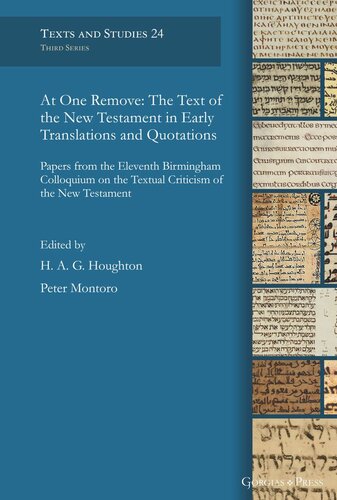

Most ebook files are in PDF format, so you can easily read them using various software such as Foxit Reader or directly on the Google Chrome browser.
Some ebook files are released by publishers in other formats such as .awz, .mobi, .epub, .fb2, etc. You may need to install specific software to read these formats on mobile/PC, such as Calibre.
Please read the tutorial at this link: https://ebookbell.com/faq
We offer FREE conversion to the popular formats you request; however, this may take some time. Therefore, right after payment, please email us, and we will try to provide the service as quickly as possible.
For some exceptional file formats or broken links (if any), please refrain from opening any disputes. Instead, email us first, and we will try to assist within a maximum of 6 hours.
EbookBell Team

4.0
86 reviewsIndirect evidence, in the form of early translations (‘versions’) and biblical quotations in ancient writers (‘patristic citations’), offers important testimony to the history and transmission of the New Testament. In addition to their value as early evidence for the Greek New Testament, versions have a textual tradition of their own which is often of considerable historical, theological and ecclesial significance. Early quotations have the potential to provide a form of text which can be attributed to a specific time and location, as well as shedding light on its interpretation. This volume brings together a series of original contributions on these topics, which were the focus of the Eleventh Birmingham Colloquium on the Textual Criticism of the New Testament. It includes an account of the newly-discovered third Old Syriac version of the Gospels, followed by studies of the Coptic, Arabic, Latin and Gothic traditions. Two Greek-Latin bilingual manuscripts are examined, Codex Bezae and the St Gall Bilingual Gospels, along with a comparison of verb forms in these languages. Biblical quotations are considered from Tertullian, Ambrose and John Chrysostom, as well as a work attributed to Rufinus the Syrian which has been key to identifying the origin of the Latin Vulgate: the early printed editions of this version are the subject of another chapter. Although at one remove from Greek New Testament manuscripts, the research described in this volume illustrates not just the ongoing importance and variety of indirect material, but also the way in which it may shape the theory and practice of text-critical scholarship and lead to new insights about this vast and rich tradition.